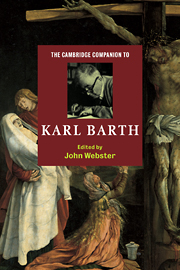Book contents
- Frontmatter
- 1 Introducing Barth
- 2 Theology
- 3 Revelation
- 4 The Bible
- 5 The Trinity
- 6 Grace and being
- 7 Creation and providence
- 8 Karl Barth’s Christology
- 9 Salvation
- 10 The humanity of the human person in Karl Barth’s anthropology
- 11 The mediator of communion
- 12 Christian community, baptism, and Lord’s Supper
- 13 Barth’s trinitarian ethic
- 14 Karl Barth and politics
- 15 Religion and the religions
- 16 Barth and feminism
- 17 Barth, modernity, and postmodernity
- 18 Karl Barth
- Index
3 - Revelation
Published online by Cambridge University Press: 28 May 2006
- Frontmatter
- 1 Introducing Barth
- 2 Theology
- 3 Revelation
- 4 The Bible
- 5 The Trinity
- 6 Grace and being
- 7 Creation and providence
- 8 Karl Barth’s Christology
- 9 Salvation
- 10 The humanity of the human person in Karl Barth’s anthropology
- 11 The mediator of communion
- 12 Christian community, baptism, and Lord’s Supper
- 13 Barth’s trinitarian ethic
- 14 Karl Barth and politics
- 15 Religion and the religions
- 16 Barth and feminism
- 17 Barth, modernity, and postmodernity
- 18 Karl Barth
- Index
Summary
The question of revelation in Christian theology is finally no less than the question of theology's own ultimate source and norm, of the conditions for the possibility of theology itself as a human activity. Insofar as theology is a matter of engaging logos and Theos, articulate human reflection and God, the question of the route to and conditions for such an engagement naturally arises. To answer this question by appeal to the category of revelation is at least to point to the inherent contingency of the circumstance and the knowledge arising out of it. There could be no procedure less fitting in an essay on Barth than that of seeking to establish some general definition of 'revelation' in terms of which to venture forth. Yet to reveal too much too quickly of the particular sense which this term bears in Barth's theology would make for an untidy chapter in which everything happened at once. For now, then, concerns of style and structure encourage the unveiling only of this: something revealed is something disclosed or given to be known to someone which apart from the act of revealing would remain hidden, disguised and unknown.
- Type
- Chapter
- Information
- The Cambridge Companion to Karl Barth , pp. 37 - 56Publisher: Cambridge University PressPrint publication year: 2000
- 4
- Cited by

